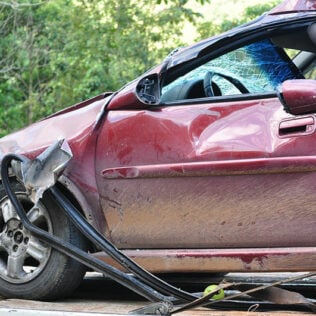When a car accident is caused by the negligent actions of a driver, an injury victim has the right to collect compensation for tangible and intangible damages. Compensation may be collected in different ways if the at-fault driver’s insurance policy does not cover the losses.
Recovering Damages After a Car Accident
Car accidents often result in serious property damages and personal injuries. In most cases, the at-fault driver’s insurance policy is responsible for paying for damage to the vehicle, medical bills, lost wages for time away from work, and diminished capacity to work.
However, in some cases, the dollar amount of damages may surpass the insurance payout available through the at-fault party’s insurance policy. When this happens, compensation for damages must be collected in other ways.
A Third Party’s Insurance Policy
If the at-fault driver was performing work-related duties at the time of the accident, the employer may be held vicariously liable for the employee’s negligent acts. Employers who have employees that travel, make deliveries and pickups, provide outside consultation services, and work at multiple worksites usually carry large accident liability insurance policies.
The At-Fault Driver’s Assets
Collecting on the at-fault party’s assets may be a possibility, but there are often roadblocks with this option. Typically, a person’s insurance coverage correlates with what he or she stands to lose in assets. For example, if a driver does not have many assets, typically, that driver will not have a large insurance policy. In Indiana, an accident lawyer is knowledgeable about laws that protect assets against liability claims and discovery laws that hamper information on a person’s financial status and net worth.
Umbrella Insurance
Drivers who possess abundant assets often invest in an umbrella insurance policy for extra protection. An umbrella policy usually kicks in when the primary insurance policy has reached its limits. The purpose of an umbrella insurance policy is to provide extra liability insurance for coverage on a home, vehicle, boat, or other expensive assets. An umbrella insurance policy provides additional protection to prevent extreme out-of-pocket liability expenses.
Under-Insured and Uninsured Motorist Coverage
This type of insurance coverage can help with medical bills, lost wages, and pain and suffering that result from a car accident. Under-insured and uninsured motorist coverage (UIM) is essential when a car accident is caused by an uninsured driver who has no means to cover the costs of property damages and personal injuries. In Indiana, drivers must carry UIM mandatory minimum coverage of $25,000 for bodily injury for each person and a minimum of $50,000 for each accident. If a policy is written after July 2017, it must include $25,000 minimum property damage.
Insurance Settlements
If a driver causes a car accident as a result of reckless, impaired, or negligent behavior, the driver’s insurance company has a duty to try to settle the damages. An insurer is liable for a judgment exceeding policy limits if in bad faith, the insurer refuses to settle within the policy limits. The duty of care and good faith requires the insurer to view the situation as if there were no policy limits applicable to the claim and give equal consideration to the financial exposure of the policyholder. If an insurance company acts in bad faith or refuses to settle a claim, an accident lawyer can work with the insurer to reach a suitable settlement or file a personal injury lawsuit on behalf of the victim.
Filing a Personal Injury Claim in Indiana
In Indiana, when a person has been involved in a car accident or another incident where someone else’s negligent behavior caused harm, he/she may file a personal injury lawsuit with an Indiana accident lawyer in civil court. When doing so, it is essential to understand and comply with the statute of limitations.
The statute of limitations to file a personal injury lawsuit in Indiana is two years from the date of the injury. It does not matter whether the case is driven by the liability principle of negligence (typical in most car accident claims) or intentional tort (which applies to injuries caused by intentional harm).
If the two-year statute of limitations expires, the court will likely file a motion to dismiss the case, unless an exception for extra time has been approved.

